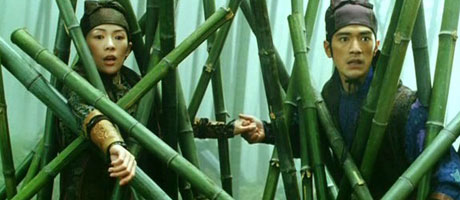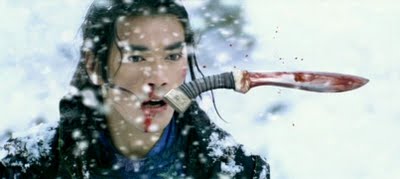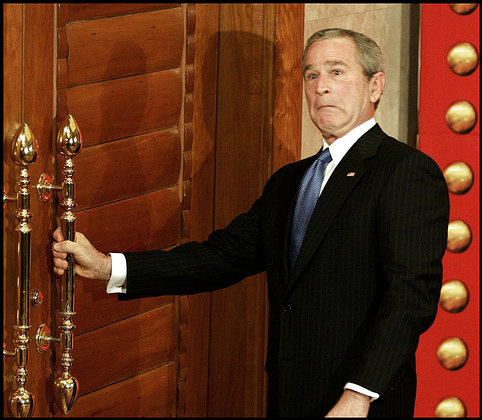Also in news-of-the-future, China sets a lunar launch date of 2024.
Tag: China
Asleep at the Switch.

Ladies and gentlemen, meet our crack foreign policy team, who apparently decided to catch some Z’s during the slight-happy official state visit of Chinese president Hu Jintao. China…sure, this one’s not important. Might as well get some shut-eye.
Report Card: Incomplete.
By way of a friend, the State Department releases its mandated yearly human rights report for 2005 (here), finding cause for alarm in Iran, Russia, China, Venezuela, Burma, North Korea, Belarus and Zimbabwe and (surprise, surprise) progress in Iraq and Afghanistan. The report doesn’t delve into human rights violations here at home (although China tries to fill that gap in response every year), but it does unequivocally state — in bold, no less — that “countries in which power is concentrated in the hands of unaccountable rulers tend to be the world’s most systematic human rights violators.” Hey y’all might be on to something. Deadpans the head of Amnesty International: “The Bush administration’s practice of transferring detainees in the ‘war on terror’ to countries cited by the State Department for their appalling human rights records actually turns the report into a manual for the outsourcing of torture.”
A “Lunar Armada.”
The LA Times examines the beginnings of the second lunar space race, which will involve, among others, the US, Europe, China, and India. “Some researchers even have a name for the first lunar city: Jamestown, in honor of the first English settlement in the New World.“
Dog Days.
Warehouses of Warcraft.
“‘We’re like a stock exchange. You can buy and sell with us,’ says Alan Qiu, a founder of the Shanghai-based Ucdao.com. ‘We farm out the different jobs. Some people say, “I want to get from Level 1 to 60,” so we find someone to do that.'” Via a friend in the program, the NYT examines Chinese online gaming factories. “Most of the players here actually make less than a quarter an hour, but they often get room, board and free computer game play in these ‘virtual sweatshops.’“
No more Dodges / inCurious George.
“I was trying to escape. Obviously, it didn’t work.” If it’s any consolation, Dubya, we all feel just as trapped. In one of those resounding visual metaphors that capture a presidency and that life occasionally kicks up for all to see (the last one being Dubya’s fiddling during Katrina), our leader gets stymied by a locked door while trying to evade a reporter’s questions about his China trip (which were pretty softball, given all the things he could’ve been asking these days.)
In somewhat related news, in the relatively sanguine Post story about the door incident, the following depressing information is included: “In five years in the presidency, Bush has proved a decidedly unadventurous traveler…As he barnstormed through Japan, South Korea and China, with a final stop in Mongolia still to come, Bush visited no museums, tried no restaurants, bought no souvenirs and made no effort to meet ordinary local people…[Laura Bush] once persuaded him to go to the Hermitage Museum in St. Petersburg, only to see him burn through the place in 30 minutes. He dispensed with the Kremlin cathedrals in Moscow in seven minutes. He flatly declined an Australian invitation to attend the Rugby World Cup while down under.”
The Executioner’s Song.
“Fighting over the ‘evolving standards of decency’ underlying the Eighth Amendment’s ban on ‘cruel and unusual punishment,’ the 5-to-4 opinions reflect an all-out war between the proponents of a living (or at least medium-rare) Constitution and those who want to see it dead (or perhaps well-done, with a nice pinot).” Slate‘s inimitable Dahlia Lithwick explains the Kennedy-Scalia sniping undergirding the Supreme Court’s very welcome 5-4 decision to ban juvenile executions. To keep things in perspective, the only other nations besides us that have put juveniles to death since 2000 are China, Iran, Pakistan, and the Congo…not exactly what you’d call the Axis of Freedom.
House of Cards.

It’s clear early on in House of Flying Daggers that Zhang isn’t shooting for anything with the ambition and gravitas of Hero…Instead, we’ve got a plot strung together with a number of genre cliches, most notably the “deep” undercover cop (Takeshi Kaneshiro) questioning his motivation and the sixth-sense-laden blind girl (Zhang Zi Yi, lovely as always) who improbably kicks more ass than Rutger Hauer in Blind Fury. Hey, genre exercises are cool…let’s get to the fighting. Alas, there seemed to be a lot of filler between the action setpieces, and I found myself hoping through several unmemorable meet-cute scenes that more low-level flunky guards would show up and be efficiently dispatched.
With that in mind, I know it’s a little late to be complaining about the realism of kung-fu sequences. But the fights in House of Flying Daggers are so stylized and farfetched that I didn’t find them all that engaging — there was no real sense of danger to be had. In Crouching Tiger, Hero and countless lesser kung-fu films, I never found myself thinking so much about the logistics of what’s going on, but Daggers seems to beg questions like, “Where are these tree-flying policemen obtaining their inexhaustible supply of bamboo spears?” and “How straight and true could you throw a dagger if gravity was of absolutely no consequence?” Perhaps it’s unfair to call out this House for its fantastical fight sequences, but for one reason or another my disbelief was suspended less than usual.
At any rate, not to give the whole game away, but the movie does eventually contain some unexpected twists in the middle going. That being said, the denouement of the film also suffers from one of the most egregious dead-“not dead” reverses I’ve seen in recent memory. If martial arts films are your bag, then you’ll probably find House of Flying Daggers an operatic tale of love, passion, and betrayal. But, as for me, I kinda wish these two young lovers had spent less time being smitten and more time smoting.

The other Japanese Occupation.
Some food for thought for my Asia-Pacific sections today (by way of Prof. Armstrong): Historian John Dower compares the Iraq imbroglio to Japanese expansion in Manchuria. Before rejecting his argument outright, at least consider the source. Dower knows a great deal about America’s experiences in postwar Japan — more, I’d wager, than anybody working in the Dubya administration.





